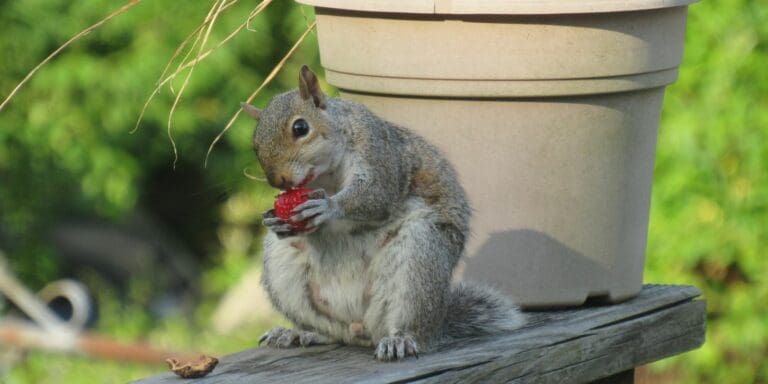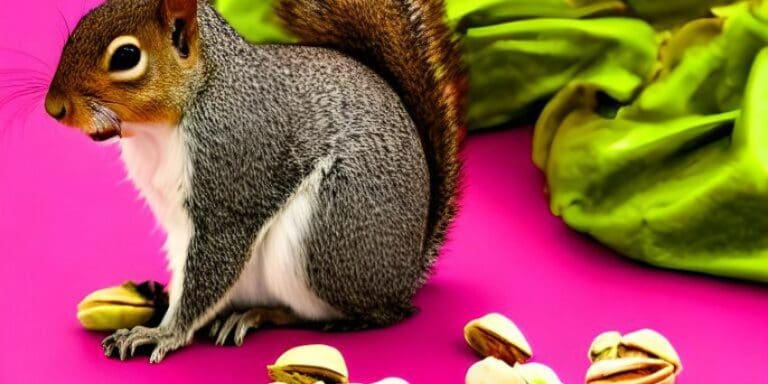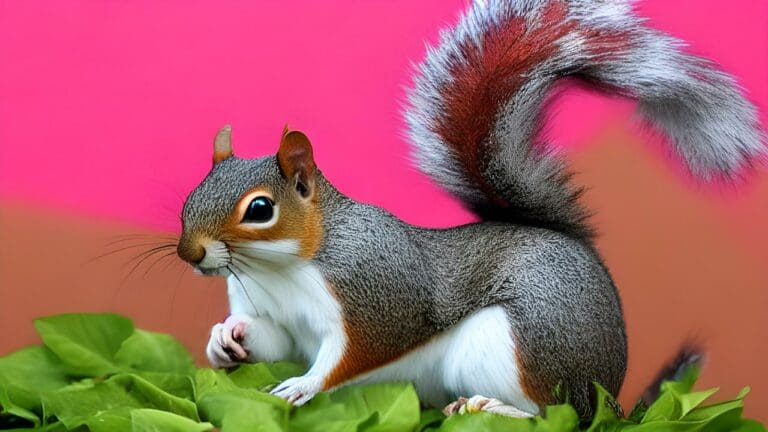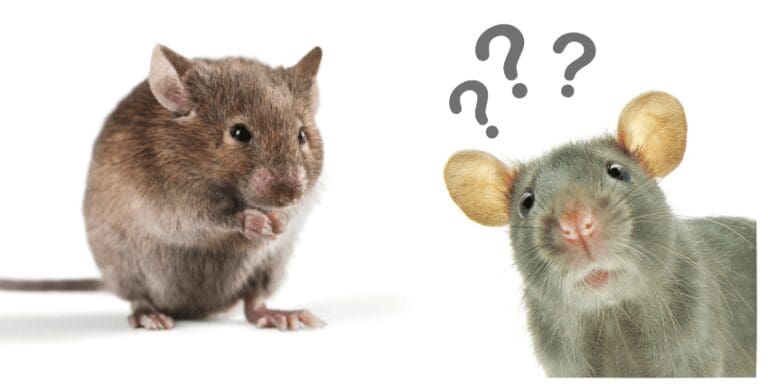Do Squirrels Eat Basil? Discover the Garden Herb Facts
Have you ever caught a bushy-tailed squirrel sniffing around your basil plants and wondered, “Do squirrels eat basil?” It turns out, your herb garden isn’t just your culinary haven—it’s a potential gold mine for these herbivorous little explorers. According to my experience, squirrels seem to love basil.
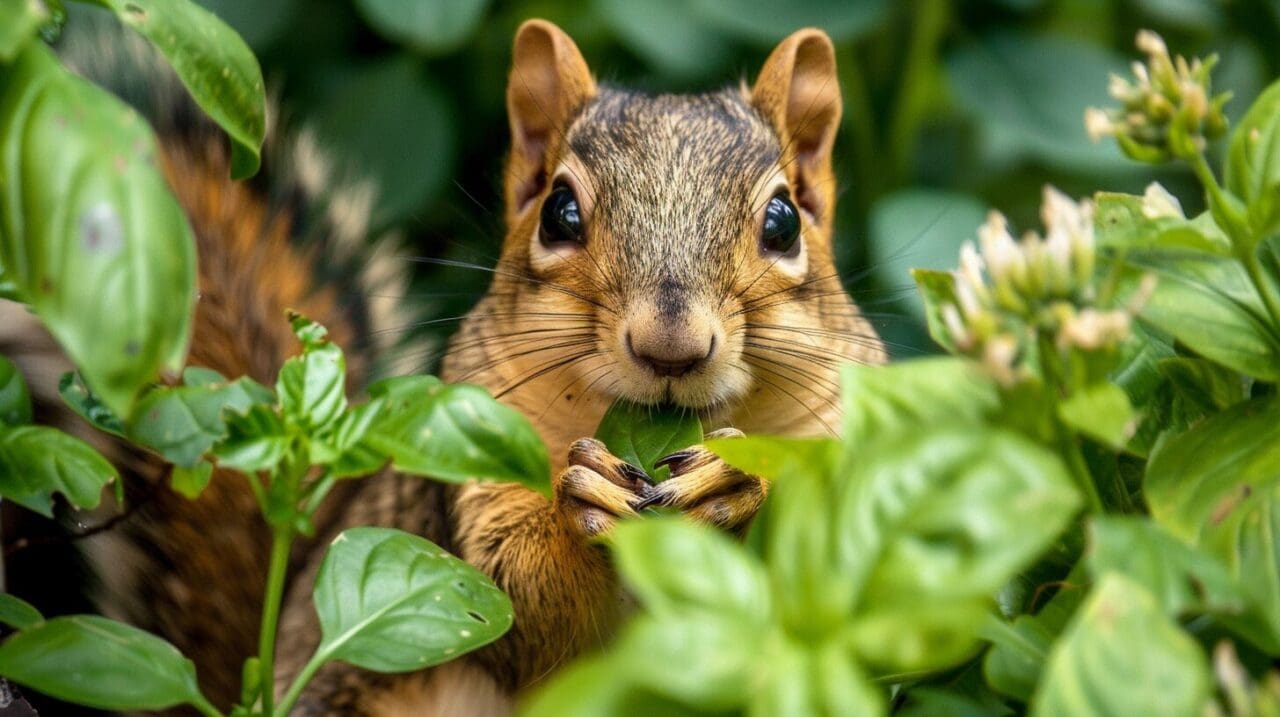
In their quest for a nutritious feast, squirrels can’t seem to resist the strong aroma and essential vitamins that basil and other squirrel-friendly plants generously offer. However, as endearing as their antics may be, guarding your green treasures from their relentless munching requires a green thumb and a bit of strategy.
Do Squirrels Eat Basil?
Basil, a herb rumored to be a squirrel-magnet. Basil does indeed entice squirrels with its compelling scent and sweet leaves, yet not all squirrel species or individuals may react the same way. Some squirrels nibble on basil with gusto, while others pass it over in favor of other greens.
What is Basil?
Basil is a type of herb known for its fragrant, sweet-smelling leaves that are used in cooking. It belongs to the mint family, Lamiaceae, and is native to tropical regions from Central Africa to Southeast Asia. Basil is a key ingredient in many cuisines around the world, particularly in Italian and Southeast Asian dishes. It’s most famously used in pesto, a sauce made from basil leaves, garlic, pine nuts, Parmesan cheese, and olive oil.
Varieties of Basil
There are several varieties of basil, each with its own unique flavor and use. Sweet basil is the most common type found in Western cuisine, especially Italian dishes. Thai basil, with a licorice-like flavor, is commonly used in Thai, Vietnamese, and other Southeast Asian cuisines. There’s also lemon basil, holy basil, and purple basil, among others, each bringing a different taste profile to dishes.
What is Basil Used For?
Beyond its culinary uses, basil is also valued for its medicinal properties, including anti-inflammatory and antibacterial benefits. It’s rich in vitamins and minerals, making it a healthy addition to any diet.
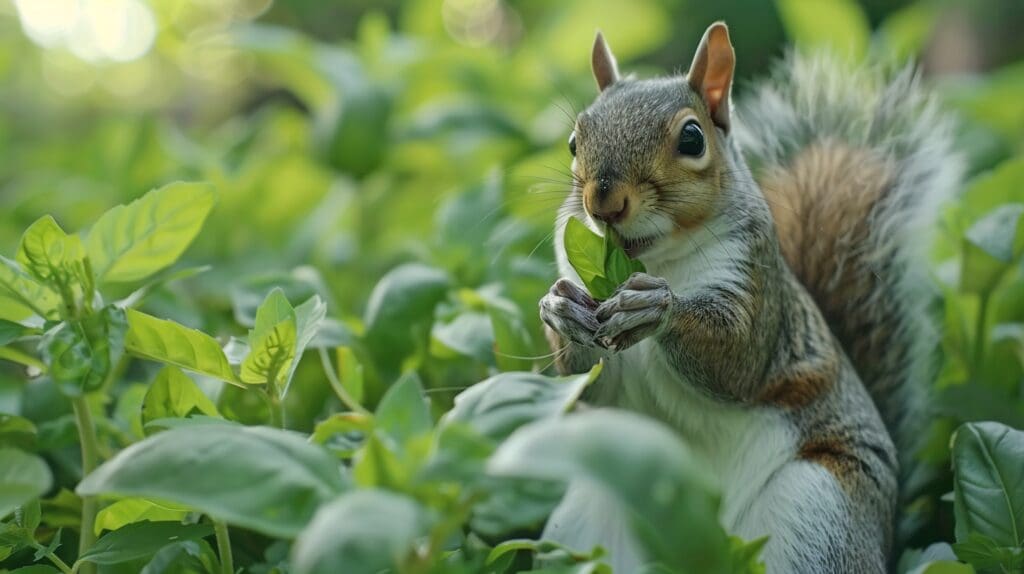
Understanding Squirrel Dietary Preferences
If you’ve ever found yourself marveling at the bustling activity of squirrels in your garden, you may have noticed their undeniable attraction to certain plants. An understanding of a squirrel’s diet is essential to coexisting with these endearing yet often pesky creatures. As varied and versatile as their acrobatic antics, the dietary preferences of squirrels play a vital role in our ecological community. So, let’s delve into what makes up the menu for these fluffy-tailed diners.
The Allure of Herbs to Squirrels
There’s something irresistible about a lush, green herb garden, not just to you, but also to the local squirrel population. Herbs offer more than just flavor; they are packed with necessary nutrients that contribute to the health and energy of squirrels. Amongst the variety, basil, with its verdant fragrance, seems to be a recurring favorite. Its large, juicy leaves are not just aesthetically pleasing to us, but are akin to a gourmet treat in the world of squirrel cuisine.
Variety in Squirrel Diet: Nuts, Seeds, and Greens
One might assume squirrels have a one-track mind when it comes to their food, but these creatures are the epitome of dietary diversity. While nuts and seeds form the backbone of the classic squirrel diet, these nimble animals are known to supplement their intake with a range of greens. Vegetables and herbs such as parsley and fennel add vibrancy to their meals, affording them a banquet of tastes and textures.
Herbs: A Picky Squirrel’s Delight or Deterrent?
While many squirrels relish the soft leaves of herbs like basil, not all herbage is met with equal zeal. Some plants serve as a natural deterrent due to their potent scents and flavors. Herbs such as peppermint and garlic, which we humans find aromatic and flavorful, are less desirable to the sensitive palates of squirrels. This selective tendency in squirrels emphasizes the importance of choosing the right plants to cultivate, depending on your aim—be it to attract or repel these bushy scamps.
Now that you’re equipped with knowledge of what ignites squirrels’ appetites and what keeps them at bay, you might find a new level of respect for their complex dietary choices. Who knew that basil consumption by squirrels was more than just a nibble here and there? They’re not just pests; they’re connoisseurs of the plant kingdom! With this understanding, you can make informed decisions that affect the interplay between your herb garden and its furry visitors.
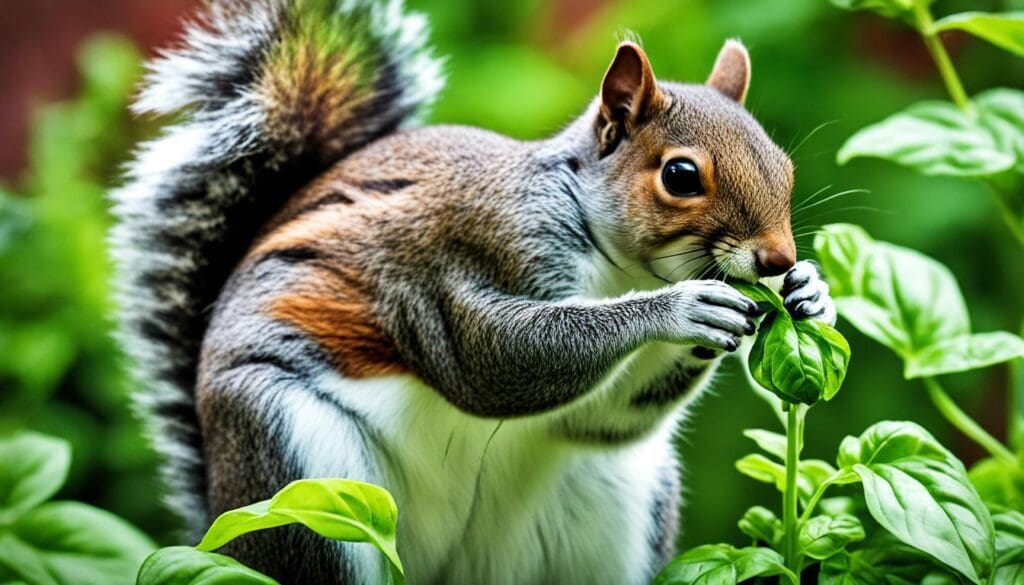
The Irresistible Aroma of Basil to Squirrels
Have you ever observed the keen interest squirrels show towards your basil garden and wondered, “Do squirrels eat basil?” Indeed, the relationship between squirrels and the herbs we cultivate is a fascinating one. Squirrels, with their ever-curious appetite, find the intense fragrance and taste of basil quite appealing. What we might consider a mere ingredient in our pesto sauce, squirrels regard as a delightful and nutrient-rich banquet.
Do Squirrels Eat Basil Seeds?
When asking, “What do squirrels eat?”, we often picture nuts and seeds, but the gustatory world of squirrels is much broader. The potent scent of basil is particularly attractive to them, and it’s not just about the taste. The nutritional benefits of basil beckon these bushy-tailed foragers, who are keen on maintaining their energetic lifestyle. But it’s not only the leaves that entice; the large seeds of basil plants are equally sought out, rich in antioxidants and flavors that squirrels find irresistible.
As you contemplate the symbiotic connection between wildlife and your garden, it’s clear that basil, with its aromatic leaves, is a strong contender for a squirrel’s menu. The herb’s appeal can have a significant impact on the footrail of your garden’s ecosystem. Below, we’ve compiled a table illustrating the particular attraction of basil to our squirrel friends, ensuring you understand the facets of this edible allure:
| Aspect | Basil’s Appeal to Squirrels |
|---|---|
| Aroma | The sweet, strong fragrance acts as an attractant |
| Nutritional Value | Rich in essential vitamins and antioxidants |
| Seeds | Large, flavorful, and filled with health benefits |
| Flavor | Sweet taste that squirrels enjoy |
Now that you’re aware of the magnetic charm basil holds for squirrels, consider this as you plan your garden. While these furry gourmets might invite themselves over for a feast, there are ways to manage their visits without stripping away the joy of watching squirrels engage with nature. With basil’s irresistible aroma and nutrition calling to them, it becomes clear why squirrels might frequently visit your herb haven.
Do Squirrels Eat All Types of Basil?
Does every kind of basil leaf serve as a squirrel’s feast, or are there varieties that they’re less fond of? With garden raids often targeting this aromatic herb, it pays off to know which types of basil are most susceptible to squirrely desires. Let’s dig into the details.
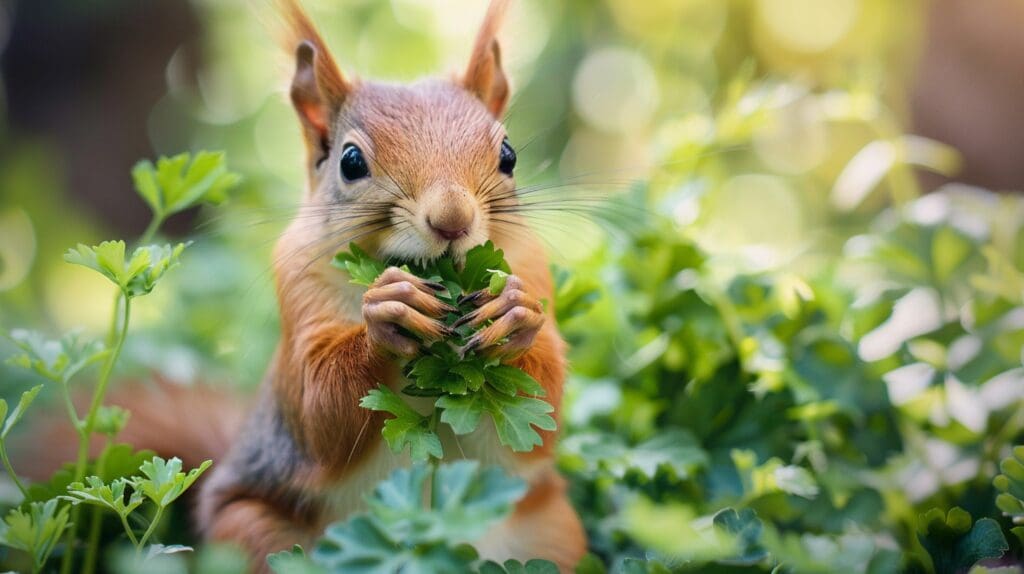
Types of Basil That Tempt Squirrel Tastebuds
As you peruse your herb garden, bear in mind that not all basil plants are equally attractive to squirrels. The sweet and potent Greek Basil typically finds itself in the crosshairs of squirrels, with the Genovese Basil not far behind. Both garner the approval of squirrels far and wide due to their sweet flavor and robust aromatics—a true delight for the senses.
On the other end of the spectrum, varieties such as Thai Basil and Opal Basil are often left untouched, possibly due to their milder essence. Furthermore, the citrusy punch of Lemon Basil and the zesty scent of Cinnamon Basil tend to repel rather than entice, giving credence to the notion not that all basil is created equal in the eyes of a squirrel.
Explore the table below showing the different basil varieties and their respective squirrel allure:
| Basil Variety | Level of Attraction for Squirrels |
|---|---|
| Greek Basil | High |
| Genovese Basil | High |
| Thai Basil | Low |
| Opal Basil | Low |
| Lemon Basil | Repellent (Low) |
| Cinnamon Basil | Repellent (Low) |
Armed with the understanding of such culinary cues, you can now make more informed choices about which basil to grow and how to protect them. Whether it’s substituting a squirrel-favorite with a less attractive variety or reinforcing your garden defense, there’s always a way to strike a balance between human and squirrel needs.
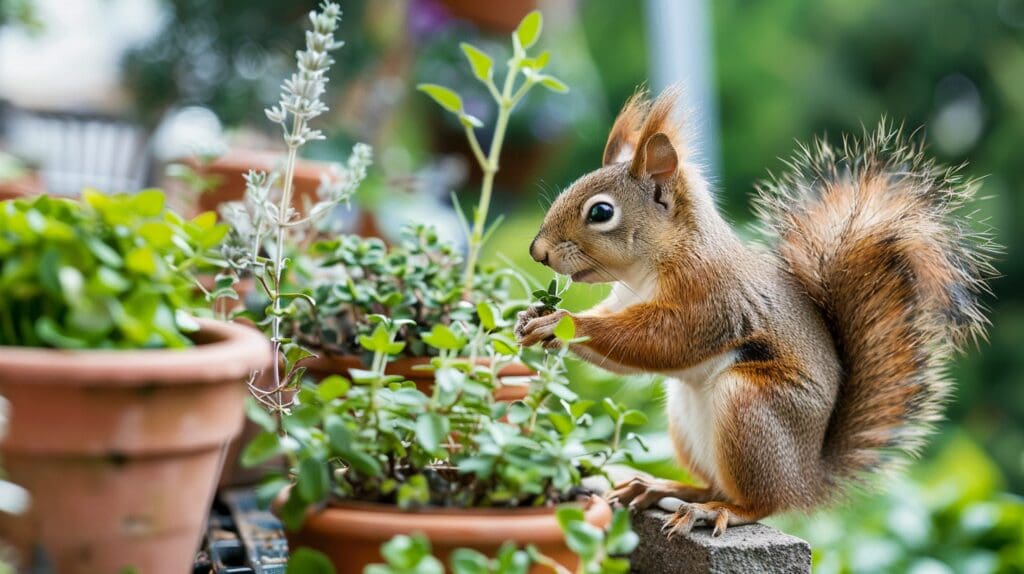
Protecting Your Basil From Hungry Squirrels
As you relish the herbaceous wonders of your garden, it’s understandable that the herbivorous behavior of squirrels can pose a challenge. Fortunately, there are various methods you can implement to shield your squirrel-friendly plants, particularly basil, from becoming an all-you-can-eat buffet for these furry critters. Let’s explore how to fortify your green treasures against their relentless foraging.
Effective Barriers Against Squirrel Invaders
To keep squirrels at a respectful distance, crafting barriers around your basil can be a game-changer. A simple yet effective approach is using chicken wire or mesh enclosures. These barriers should be snugly secured around plants to prevent squirrels from reaching the leaves and seeds they covet so dearly. The mesh must be fine enough to block access but also offer room for your basil to flourish unimpeded. Remember, spacing is key to both promote plant health and deter those determined invaders.
Using Safe Repellents to Keep Squirrels at Bay
If physical barriers are not your preferred route, consider employing repellents that make your herb garden less appealing to squirrels. Mint stands out as a robust natural deterrent. Planting a border of mint around your basil can create a scent barrier that squirrels typically dislike. Cayenne pepper coffee grounds serves a similar function; sprinkling either of these around the soil can repel squirrels due to their essence. Furthermore, employing motion-activated devices, such as lights and sprinklers, can add an extra layer of defense, startling squirrels away from your prized plants.
It’s not just about keeping squirrels away; fostering natural predators in your garden’s ecosystem can also mitigate the need for squirrel control. By creating a habitat that encourages the presence of birds of prey, you can let nature take its course, helping to manage the squirrel population through predation. While the balance between nurturing your basil and host natural wildlife may seem delicate, it’s a symbiotic relationship that, when managed smartly, can benefit the biodiversity of your backyard oasis.
- Use tight-knit mesh or chicken wire to make physical barriers
- Plant mint strategically around your basil as a natural deterrent
- Apply cayenne pepper around plants to repulse squirrels
- Install motion-activated lights and sprinklers to startle and deter squirrels
- Encourage natural predators to help control the squirrel population organically
Squirrel-Friendly and Unfriendly Herbs: A Guide for Gardeners
As you consider planting a new herb garden or revamping an existing one, it’s beneficial to know which herbs are likely to attract squirrels and which ones discourage their visits. The answer to “Do squirrels like to eat herbs?” is complex—while they do incorporate a variety of herbs into their squirrel diet, they have a clear preference for certain flavors and scents. To help you plan your herb garden with these furry gardeners in mind, let’s break down the types of herbs that are squirrel-friendly and those that are not.
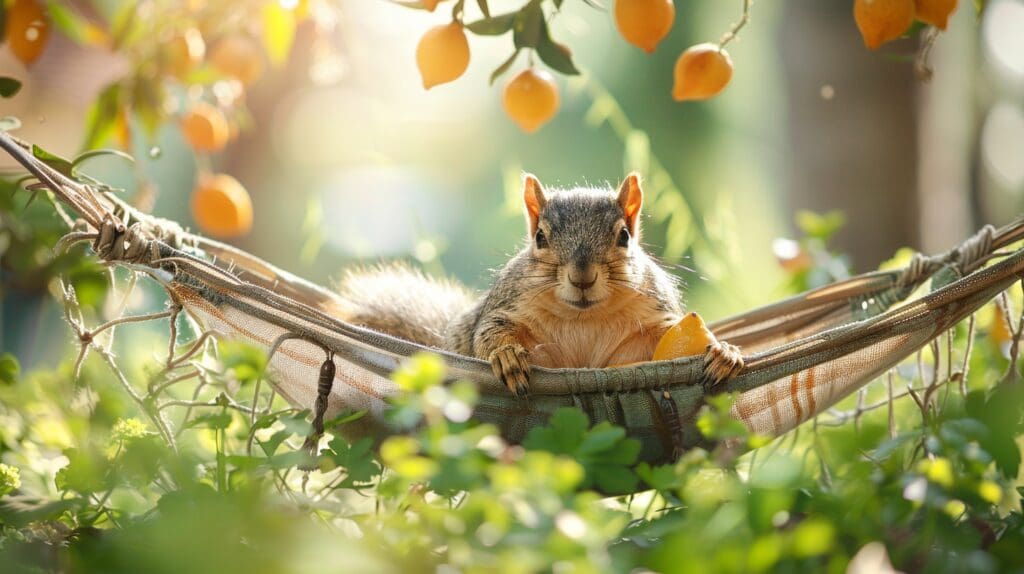
Herbs such as parsley, basil, and watercress are safe bets if you’re aiming to appeal to the local wildlife. However, there are also herbs that might not be as tempting to our squirrel friends. The table below details some common herbs that squirrels prefer, as well as those that might keep your garden squirrel-free.
| Herb Type | Attraction Level |
|---|---|
| Parsley | Highly Attractive |
| Basil | Highly Attractive |
| Watercress | Attractive |
| Lavender | Repellent |
| Daffodils | Unattractive |
| Alliums | Repellent |
| Dill | Attractive |
| Cilantro | Attractive |
| Thyme | Attractive |
| Rosemary | Repellent |
| Mint | Repellent |
| Peppermint | Repellent |
Now that you’re familiar with the types of herbs that both attract and repel squirrels, you can design your garden to either welcome these curious animals or encourage them to look elsewhere for snacks. Utilizing these insights about the squirrel diet, your herb selection can either be squirrel-friendly or unfavorable depending on your preference. Whether you’re aiming for a bustling wildlife hub or a serene, undisturbed sanctuary, your herb choices play a crucial role.
Real Stories of Squirrels in the Herb Garden
Real anecdotes from gardeners often offer a treasure trove of insights about the dietary patterns of local wildlife. These accounts shed light on the squirrel-friendly plants that inexplicably stay untouched and those that seem to vanish under the cover of bushy tails and scampering paws.
One story goes that a gardener noticed a peculiar pattern: while her garden of Genovese and Greek basil flourished, it did so with no thanks to the local squirrels, which much preferred the neighboring thyme and parsley. Another tale from a different garden hint at squirrels bypassing Lemon Basil, only to feast on the Sweet Basil planted a few feet away.
These snapshots of daily garden life reveal the intricate tastes of these creatures, ones that we are only beginning to understand. As gardeners share their observations and as you pay attention to the green visitors in your own herb sanctuary, a picture begins to emerge—one of squirrels as selective gourmands rather than indiscriminate foragers.
Subscribe to the Free VIP Squirrel Scoop Insider Magazine
Written by none other than Bart the Balcony Squirrel, this lighthearted take on life and current squirrel-related world events is sure to bring a smile to your face. From his perch on the Kitty City Squirrels balcony, Bart brings a unique and entertaining perspective to every issue. Why wait, Subscribe now!
The Verdict on Squirrels and Basil Consumption
Your awareness of the garden’s ecosystem is key in nurturing a friendly detente between squirrels and your basil plants. Much like a chef selecting the finest ingredients, squirrels, too, pick their favored basils—sweet and nutrient-rich. Yet, as you’ve come to know, not all basils are created equal in their eyes. By astutely observing which herbs attract and which deter, you’re enabled to create a garden that both flourishes and harmonizes with its environment.
FAQ
Do squirrels eat basil?
Yes, squirrels are attracted to basil due to its strong aroma and essential vitamins, making it a favored treat among these rodents.
What are the feeding habits of squirrels?
Squirrels are primarily plant-eaters and can be considered omnivores, as they consume a mixture of nuts, seeds, and occasionally insects. They also have a particular preference for herbs, including basil, parsley, and fennel.
Are some types of basil more attractive to squirrels?
Certainly, squirrels display varied preferences for different basil types. Varieties like Greek Basil and Genovese Basil are especially popular with squirrels, while others such as Thai Basil and Opal Basil are less frequently consumed.
Can using certain plants deter squirrels from my herb garden?
Yes, planting herbs with strong scents like mint, peppermint, rosemary, and garlic can act as natural repellents due to their offensive taste or toxicity to squirrels.
What are effective barriers to protect basil from squirrels?
Gardeners can use measures like chicken wire or mesh barriers around the basil plants. Additionally, scent deterrents, natural repellents such as cayenne pepper, and motion-activated devices can help keep squirrels at bay.
How can I create a squirrel-friendly garden without risking my herbs?
To foster a garden that both humans and squirrels can appreciate, strategically plant squirrel-repellent herbs to protect your more vulnerable plants and include some squirrel-friendly plants that these animals prefer to aid in keeping them away from the herbs you’d like to preserve.
What are some misconceptions about squirrels and their eating habits?
A common misconception is that squirrels will eat just about any herb. In reality, squirrels are selective and may ignore plants that are unappealing due to their scent or taste while thoroughly enjoying others.
Are there benefits to having squirrels in my garden?
Yes, squirrels can help aerate the soil with their digging behavior. Moreover, the seeds they forget to retrieve can lead to new plant growth, contributing to a vibrant garden ecosystem.
How do I handle the squirrel population in my garden?
Alongside physical barriers and repellents, encouraging natural predators and adapting to the feeding habits of squirrels can help manage their population and protect your garden.
